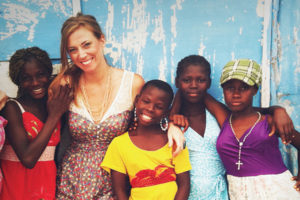By Christa Rodriguez || Campus Life Editor

This Thursday’s Common Hour, titled “Art & Aid: How Spoken Word, Instagram and Flash Mobs Helped Vulnerable Girls in School and Combat Ebola,” was given by Katie Meyler, founder and CEO of More Than Me. The Common Hour was proposed by Sophia Das ’19, and was co-sponsored by Women’s Gender and Sexuality Studies and Africana Studies programs.
Meyler has presented about her organization to multiple audiences, including a TEDx Talk and the United Nations. She has been highly praised in many major publications, including being declared a TIME person of the year in 2014.
Meyler told her personal story through performing spoken word poetry. She was poor for most of her life, but realized what real poverty was while visiting Haiti. She came to realize that she was privileged, because she did not have to struggle daily for basic human rights. Right out of college, an organization she was involved in sent her to Liberia, a West African country formed by freed slaves from the United States. Despite a civil war that had ruined the country’s infrastructure, Meyler found Liberia to be a vibrant, beautiful place. While there, she befriended some children, and asked them, “If you could have anything in the world, what would it be?” They replied that they wanted to go to school, but it was too expensive. She decided to use social media to raise money to have them go to school. She started out using Myspace, but now uses Facebook and Instagram. Meyler quickly learned that the girls were more vulnerable than the boys, and began focusing on them.
People began suggesting to Meyler that she start an organization to help the girls in Liberia. At first, she had doubts about whether she was qualified. According to Meyler, the best advice she received was, “Get over yourself.” She continues to use this mantra, and reminds herself that what she is doing is not about her. To Meyler, it is important to “live for something bigger than yourself.”
From these experiences, she started the organization More Than Me. The first female President of Liberia, Ellen Johnson Sirleaf, got involved, and provided Meyler with a free government building. Still, Meyler had to raise funds to fix it up. Fortunately, she won one million dollars from the Chase Bank American Giving Awards, which she also used to make the organization more legitimate with a hired team. In September 2013, Meyler cut the ribbon with President Sirleaf, officially opening the first tuition-free all-girls school in Liberia. The school includes two free meals a day, access to technology, and a health center. The girls quickly skipped grade levels, and were doing well – until Ebola hit.
In the United States when the Ebola epidemic started, she quickly went back to Liberia. She asked Doctors Without Borders to train her and her team to help Liberians on the front lines. Meyler saw all different groups coming together to fight Ebola, but they lacked the resources. They would call an ambulance, and it would not come for four days. They eventually got their own ambulance that they drove around themselves. Although they saved many lives, still many people died. Meyler said when there was nothing left to do, they would sing, giving dignity to death. Helpers in the U.S., including Sophia Das, would collect supplies and ship them to Liberia.
Whole families would die, and there were children left without any immediate relatives still alive. Meyler described a little girl who sat there crying while others were being released from a hospital, because she had no one left. Finally, they were able to release her to cousins. The broken systems in Liberia, to Meyler, were partly to blame for why Ebola broke out as bad as it did. She acknowledged the local people in the communities as the real heroes. While they did not have a choice but to fight, they did not give up either.
Meyler connected the problems of health and education in Liberia by saying that a country cannot build a proper health care system without a proper education system. When Meyler started out, there was no real education system in Liberia. Many families would give bribes to move their children up the grade levels and pass their final exams. Meyler is also working with Liberians to start more schools in different counties because there are currently few resources for education. Meyler hopes to make “the largest education reformation in a country” with a project called Partnership Schools for Liberia. Meyler believes that education and basic health care are human rights.
Meyler believes that anyone can do the impossible. She ended her talk with another spoken word poem titled, “She is My Promise,” about a Liberian girl named Abigail that when missing, and is likely living as a prostitute or sex slave.
Meyler noted, “We’re all humanity, we’re all people, and we all want what’s best for our children.” She encouraged the audience to find something they do not like and change it, because no one else is going to do it. She believes strongly that every child deserves basic human rights. She said, “Before I’m an American, I am a human being.” To Meyler, everyone can aspire to live for something bigger than themselves.
Sophomore Christa Rodriguez is the Campus Life Editor. Her email is crodrigu@fandm.edu.